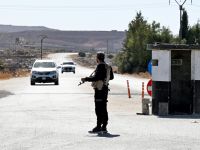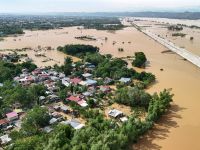Israel said most of its forces withdrew from the Gaza Strip on Wednesday evening, after large numbers of infantry and armored troops stormed into three Palestinian towns before dawn. However, a small number of troops were still deployed in the hilly region overlooking the town of Beit Hanoun.
Six Palestinians were killed during the latest Israeli incursion, in which 18 Palestinians arrested. Israel claimed it foiled an attack late Wednesday on the Jewish settlement of Morag in the southern Gaza Strip when soldiers spotted four armed Palestinians and gunned one down, military radio said. Palestinian security officials confirmed a Palestinian had been killed in the area, but were unable to provide further details.
Earlier, Palestinian security officials said three policemen were killed in Dir al-Balah when an Israeli bulldozer destroyed their post. Israeli troops shot two other Palestinians in an exchange of fire in Beit Hanoun. About 17 people were injured in the whole operation, Palestinian medics said, including two boys shot after venturing into the streets of Beit Hanoun after the Israelis slapped a curfew on the town.
Several shooting incidents took place Wednesday in the Gaza Strip. Two mortar shells were fired at an Israeli settlement in southern Gaza. No Israeli injuries were reported, and no damage was caused.
In addition, several incidents took place in the West Bank on Wednesday. Shots were fired upon an israeli outpost near Nablus. No one was injured. Earlier in the evening, two Israelis were injured and another was treated for shock when shots were fired upon their vehicle north of the settlement of Kadim, near the West Bank city of Jenin.
Straw
On the diplomatic front, the British foreign secretary, Jack Straw, reinforced growing US and Israeli pressure on Palestinian leader Yasser Arafat, saying there was no way of halting a degenerating situation in the Middle East unless Israel's security was assured.
Straw's visit in Tel Aviv and the Ramallah starts a round of European diplomacy, to be followed up by the visiting German foreign minister, Joschka Fischer.
Straw's message for Arafat was in tune with recent remarks by the U.S. administration. "The first step that has to be taken is to make the lives of the people of Israel much more secure and that means clamping down on the terrorism coming out of the occupied territories," Straw told a press conference after talks with the Israeli foreign minister, Shimon Peres, and its defense minister, Binyamin Ben-Eliezer.
Later, the British minister held talks with Arafat. Speaking after the lengthy meeting in Ramallah, Straw told reporters he had had "a very frank conversation" with Arafat, in which he (Straw) spoke about the urgent need to stop the violence and get back to the negotiating table. "We talked of the further steps that should be taken in the area of the Occupied Territories to deal with the extremists who undermine the vision of peace for the whole land," he said.
"There is no future in violence. Mr. Arafat talked about the peace of the brave and it is a time when brave actions are needed," Straw said. However, instead of condemning Israeli policies, Straw preferred to urge Arafat to do more to stop the violence.
"Suicide bombings undermine the possibility of a political process," Straw said. "It is still our judgement and it is our duty to say that there are further steps that need to be taken to deal more effectively with the extremists."
When pushed on whether or not he would respond to the British Foreign Secretary's demands for "further steps", Arafat commented. "After my call for peace on December 16, we gave the Israelis 24 days of calm when they asked for only seven," he said.
"This is more than was asked for in the Mitchell Report or in any other negotiations, and we accepted it and gave them 24 days. But in spite of that, they continued with the assassinations, with the bombing of our cities, our towns, and of our houses," Arafat said. (Albawaba.com)
© 2002 Al Bawaba (www.albawaba.com)







